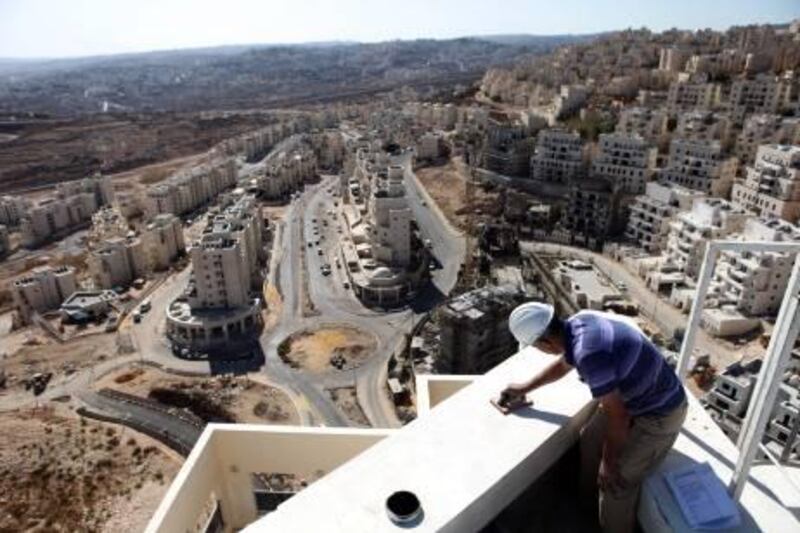RAMALLAH // A top Palestinian official yesterday called on the world community "to stand up to its responsibilities" and end Israel's "arrogant assault on international law and Palestinian rights".
Saeb Erekat, the top Palestinian negotiator in now dormant peace talks with Israel, was referring to Israel's decision to impose financial sanctions and expand Jewish settlements in reaction to Palestine joining the United Nations' educational, scientific and cultural agency.
The cabinet of Israel's prime minister, Benjamin Netanyahu, on Tuesday decided on the measures following a vote a day earlier that admitted the Palestinians as a full member of Unesco.
Mr Netanyahu insisted yesterday the decision to accelerate settlement building was a fundamental right, not punishment for the Palestinians joining Unesco. "We build in Jerusalem because it is our right and our obligation; not as punishment but as a basic right of our people to build its eternal capital," Mr Netanyahu told members of parliament.
The measures include the construction of 2,000 settlement housing units in the West Bank and East Jerusalem as well as withholding the monthly transfer of tax and customs revenues that Israel collects on behalf of the Palestinian Authority (PA).
Mr Erekat said the failure to give the Palestinians their own money amounted to a "theft" by Israel that is happening in "broad daylight".
A majority 107 of Unesco's 173 voting countries chose to extend full membership to the Palestinians on Monday - a success that Palestinian officials hope to replicate as they apply to join more international organisations.
Ibrahim Khraishi, a Palestinian diplomat in Geneva, told the Associated Press on Tuesday that the vote would "open the door" to 16 other UN agencies. This would likely include institutions ranging from the World Trade Organisation and World Bank to the International Criminal Court.
"We are working on it, one by one," he said. "Because it's now precedent that we are a full member in one of the biggest and one of the most important UN agencies, Unesco."
The Palestinian attempts at independence have irked the administration of Barack Obama, the US president, which responded to the Unesco decision by suspending a $60 million (Dh220.3m) payment to the organisation.
Canada announced on Tuesday it would not increase its annual contribution of $10m. John Baird, Canada's foreign minister, described his country's reaction to the UN agency's decision as "deeply disappointed" and as "a result of this decision, Canada has decided to freeze all further voluntary contributions to Unesco".
The Obama administration firmly opposes Palestinian attempts at statehood recognition outside the framework of direct peace negotiations with Israel that it has sponsored for the past two decades.
Palestinian officials, however, no longer consider Washington impartial enough to act as the sole broker for such talks. Mahmoud Abbas, the PA president, has threatened to dissolve the authority altogether over what many Palestinians consider Israeli-American stonewalling of their ambitions for independence.
Nablil Shaath, a senior official in the West Bank's dominant Fatah faction, confirmed there were serious discussions about dissolving the PA. "It's not an option that I favour, but it's something that is now increasingly on the table," he said yesterday, describing it as a possibility because the Palestinians "can't drop to our knees and beg with our occupier".
It is not clear how long Israel intends to withhold payment of tax revenues. The money - amounting to about $100m a month - mostly goes toward paying the salaries of 140,000 PA employees.
The Israeli newspaper Haaretz reported a dispute between Ehud Barak, Israel's defence minister, and Yuval Steinitz, Israel's finance minister, during Tuesday's cabinet meeting over whether to permanently suspend the tax transfers. The newspaper reported Mr Barak warning that long-term suspension could threaten stability in the West Bank.
Palestinian officials also have warned that such suspensions could seriously undermine the PA: it is already suffering from a $1bn budget deficit, with $300m of promised international aid undelivered and mounting debt owed to private banks.
A similar decision by Israel not to transfer tax money in May forced the PA to cut back payment of salaries over the summer, prompting angry demonstrations by public employees and unions. The shortfall was alleviated at the last minute by a donation of $200m from Saudi Arabia in September.
For many Palestinians such as Maes Shkukan, the prospect of not receiving a salary in the coming days would put a damper on the upcoming Eid holiday.
"It's so sad to see this happening," said the 30-year-old employee of Ramallah's municipality government, who called Palestinian Unesco membership "our right".
"It would make Eid that much more difficult for a lot of people."
hnaylor@thenational.ae





